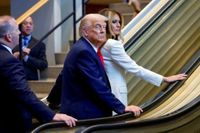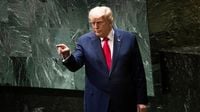The United Nations General Assembly’s high-level week in September 2025 was expected to be a showcase of global diplomacy, urgent calls for peace, and impassioned debates about the world’s most pressing issues. Instead, a seemingly minor technical mishap involving an escalator at the UN headquarters in New York City became an unlikely flashpoint, fueling political drama, conspiracy theories, and heated rhetoric both inside and outside the Assembly Hall.
On September 24, President Donald Trump, attending the UN General Assembly with First Lady Melania Trump, stepped onto an escalator that abruptly stopped, forcing the couple to climb the remaining steps on foot. The moment, captured on video and quickly disseminated across social media and news outlets, was initially explained by the UN as a simple accident—one of Trump’s own cameramen had allegedly tripped the escalator’s safety mechanism at the top.
But for Trump and his allies, the incident was far from innocent. According to Rolling Stone, the president used his subsequent speech at the UN to complain about the malfunction, quipping, “These are the two things I got from the United Nations: a bad escalator and a bad teleprompter. Thank you very much.” The comment, delivered with characteristic bravado, did little to quell suspicions among Trump’s supporters, who saw the event as a deliberate act of sabotage.
White House Press Secretary Karoline Leavitt quickly amplified those suspicions on Fox News, asserting that the incident was “likely deliberate.” She pointed to a report from The Times of London, which claimed that UN staffers had joked about shutting off escalators and elevators during Trump’s visit to force him to take the stairs. “There was some concerning reporting over the weekend from the London Times... that U.N. globalist staffers were basically plotting to set up the president of the United States,” Leavitt told Fox host Jesse Watters. “And first it was the escalator, then it was the teleprompter, and then... the audio inside of the room was much lower and different for the president of the United States than the previous speaker.”
Leavitt’s remarks were not limited to television. On social media platform X, she warned that any UN staffer who deliberately stopped the escalator should be “fired and investigated.” The Secret Service, she added, was investigating the incidents, vowing that “there better be accountability for those people. And I will personally see to it.”
The controversy didn’t end there. President Trump himself took to Truth Social, labeling the malfunction a “sinister event,” and speculating about “triple sabotage” involving the escalator, teleprompter, and audio issues during his speech. “It stopped on a dime,” he wrote. “It’s amazing that Melania and I didn’t fall forward onto the sharp edges of these steel steps, face first. It was only that we were each holding the handrail tightly or, it would have been a disaster. This was absolutely sabotage.” Trump demanded an immediate investigation, calling for security tapes to be preserved and the “people that did it” to be arrested.
Conservative commentators and right-wing media figures seized on the narrative. Fox News host Jesse Watters suggested that the United States should “either leave the U.N.,” or even “bomb it.” Rep. Greg Steube of Florida commented on Fox Business that “it seems to be intentional, let’s hope it wasn’t.” Others, like Will Chamberlain, called the incident “remarkably dangerous,” while Trump confidant Laura Loomer spun out worst-case scenarios of assassination attempts or catastrophic injury.
As the uproar grew, a Gallup poll released just days before the UN General Assembly debate showed that 63% of Americans believed the UN was doing a poor job, with only 32% viewing it favorably. According to the Daily Caller, these numbers reflected growing skepticism about the institution’s effectiveness and impartiality, sentiments that Trump and his supporters were quick to exploit.
Meanwhile, the rest of the world’s attention was focused on the weighty matters being debated at the UN. On September 22, French President Emmanuel Macron broke with the United States and recognized Palestine as a state, joining ten other nations in a move designed to pressure Israeli Prime Minister Benjamin Netanyahu toward a ceasefire in Gaza. “Nothing justifies the ongoing war in Gaza. Nothing. On the contrary, everything compels us to definitively end it,” Macron declared, as reported by PassBlue.
Other leaders made headlines as well. Ukrainian President Volodymyr Zelensky called for new drone technology to counter Russia’s offensives. Kenyan President William Ruto criticized the UN for failing to fund the Multinational Security Support mission in Haiti. Palestinian Authority leader Mahmoud Abbas publicly rejected Netanyahu’s “Greater Israel” plan, while a number of African nations pressed for permanent Security Council seats.
Back in New York, the drama extended beyond the Assembly’s official proceedings. As PassBlue noted, cultural events proliferated across the city, with artists and organizations using the occasion to engage international delegates and spotlight global issues. In Midtown Manhattan, Foreign Policy hosted a panel titled “Foundations of the Future,” where experts debated how to protect democratic ideals amid rising authoritarianism and inequality. “It’s a dangerous time for the world, but it’s also an opportunity,” said Binaifer Nowrojee, president of the Open Society Foundations. She called for empowering grassroots movements and local groups, emphasizing that “their wisdom, and the way they see the world, actually builds up transnationally to give an inflection into the global positions that we can take.”
Janine di Giovanni, director of The Reckoning Project, highlighted the dangers faced by journalists and healthcare workers in conflict zones, lamenting that “we’re living in a time where this is normalized.” Maurice Mitchell, national director of the Working Families Party, argued that “defeating the global right” would require redefining democracy to make it meaningful for everyday people.
Yet, for many in the American political sphere, the escalator incident remained the week’s defining moment. President Trump’s demand for an investigation, his supporters’ cries of sabotage, and the administration’s calls for accountability became a microcosm of the broader tensions between the United States and the United Nations, as well as the deepening divides within American politics itself. Even as world leaders debated war, peace, and the future of democracy, a fleeting mechanical glitch became a symbol of suspicion, grievance, and the relentless churn of the modern news cycle.
In a week meant to highlight the gravest challenges facing humanity, it was the brief stutter of an escalator—magnified by politics and media—that stole the spotlight, reminding everyone that, sometimes, the smallest incidents can spark the biggest controversies.


